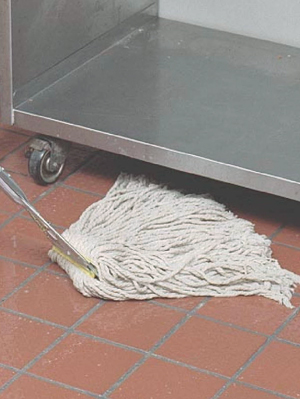
Fly-fighting Tips and Tricks
November 13, 2008
By Bill Melville
As a baker, your reputation is only as good as the quality of your products. That is why your business simply can’t afford to be associated with anything that would jeopardize consumer confidence, including a fly infestation.
| Sloughing off dangerous bacteria every time they land and carrying more than 100 pathogens, flies aren’t welcome in bakeries. |
 |
| Immediately clean any spills or standing water in or around the facility to eliminate food and moisture sources for flies |
 |
| Installing plastic strips from the top edge of doors will help prevent flies entering storage areas through open entryways |
As a baker, your reputation is only as good as the quality of your products. That is why your business simply can’t afford to be associated with anything that would jeopardize consumer confidence, including a fly infestation.
In addition to being a nuisance, flies are filthy insects that can slough off numerous dangerous bacteria every time they land. Carrying more than 100 pathogens, flies can transmit foodborne illnesses such as E. coli and salmonella. Their presence also leaves you vulnerable to negative attention from your customers, third-party auditors and the media – sometimes resulting in expensive litigation.
Because flies can cover large distances very quickly, it doesn’t take them long to contaminate large amounts of product. Drawn indoors by decaying organic matter and sugars, flies will make a home in your building if they have access to their essential survival needs – food, water and shelter.
There is no doubt that flies are a big concern for bakeries, but fortunately you can implement an integrated pest management (IPM) program that incorporates specific fly prevention and treatment options. IPM focuses on proactive sanitation and facility maintenance, thereby reducing the need for regular spraying and reactive chemical treatments.
Your first step in implementing IPM is to contact a pest management professional who is trained in pest biology and behaviour and can identify which types of flies are affecting your bakery. Fly control treatments work best when used for specific insect species and/or insects in certain growth stages. Your pest management professional should inspect your facility for any evidence of breeding sites and/or the recent history of fly activity, to ensure the most effective treatment is recommended. After the inspection, he or she will likely include some of the following sanitation and facility maintenance tips to treat current problems and prevent future infestations:
Sanitation
• Immediately clean any spills or standing water in or around the facility.
• Because flies like to frequent sink and floor drains, use a biological drain cleaner with naturally occurring bacteria and enzymes to remove leftover organic material. Consider washing the floor with an organic cleaner to help remove any elements that attract flies in the first place.
• Take the trash out on a regular basis and line and cover all trash cans to limit food sources for flies. Place dumpsters and compactors as far away from the building as possible, so that smells emitting from the trash draw flies away from your building.
Facility maintenance
• Use sodium vapour lights in areas where you traditionally use mercury vapour or fluorescent lights, as flies are less attracted to the light emitted from sodium vapour bulbs. Also, position exterior lighting so that it is located away from the building, shining back towards the building instead of the traditional positioning above doorways.
• Positive airflow helps prevent flies from entering your facility. The airflow from your building should push flies out when they try to get in through an open door or window. Test your facility’s airflow by dropping a tissue paper in front of an open door. If the tissue blows toward the outside, you have positive airflow. Work with your HVAC professional to correct the building’s airflow if needed.
• Professional air curtains are high-speed fans that will push flies out of entryways that remain open for a considerable amount of time. You can also place fans near loading docks and other high traffic areas to create an air current that flying insects cannot penetrate.
• Install plastic strips from the top edge of doors, to prevent flies from entering storage areas through these open entryways.
• Keep windows and doors closed to keep flies from gaining entrance to your facility.
• Replace all window and door screens with No. 16 mesh screens, which prevent even the smallest fly from squeezing through.
• Install weather stripping around doors and windows to prevent flies from entering through small crevices.
• Install insect light traps inside entrances to storage and baking areas. The ultraviolet light attracts flies to a non-toxic sticky board that your pest management professional can use to keep track of how many and what types of flies have been trapped within your facility.
Detailed documentation is also an important component of an IPM program, not to mention one that auditors scrutinize closely. Make sure your pest management professional keeps accurate and updated records, including service reports, corrective actions, pest activity reports, trend data, pesticide usage logs, material safety data sheets (MSDS) and floor plans. Keep all records in a central location for easy access. These documents will help you track your progress and serve as evidence that your IPM program takes steps to prevent and effectively manage infestations.
Remember, it is not enough for you and your pest management provider to implement IPM initiatives. Even the most rigorous program depends on the active co-operation of your staff to be effective. Educate your employees on the specific actions they can take to support your efforts, such as keeping their workspaces clean and notifying you of any sanitation or facility maintenance issues they notice in and around the facility. This will go a long way in preventing fly infestations and upholding a reputation for quality.
Bill Melville is the quality assurance director for Orkin PCO Services. He has 35 years of experience in the industry and is an acknowledged leader in the field of pest management. For more information, e-mail him at bmelville@pcocanada.com or visit www.orkincanada.com.
Print this page
Leave a Reply